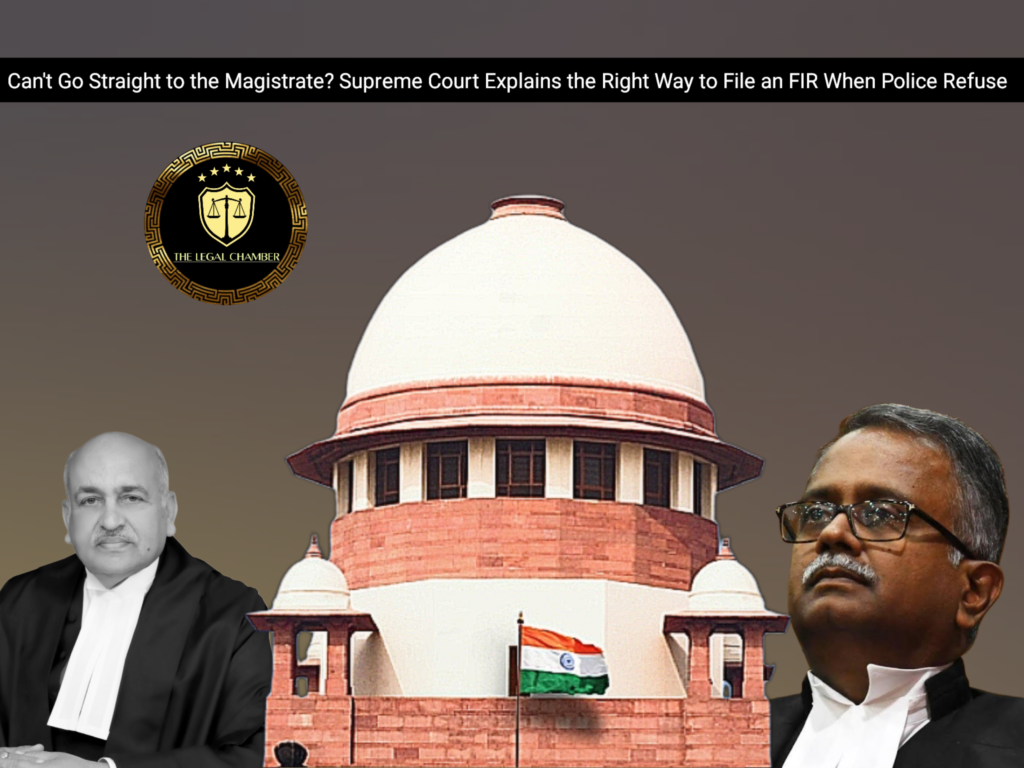
The Supreme Court upheld that a Magistrate’s order under Section 156(3) CrPC directing FIR registration, even if passed without the informant first approaching the Superintendent of Police, is a mere procedural irregularity and not illegal. The Court affirmed that such an order must be a reasoned one reflecting application of mind, and refused to quash the FIR at the chargesheet stage, leaving the matter for trial.
Facts Of The Case:
Based on a Memorandum of Understanding (MoU) from 1995, a financial dispute arose between M/s Sunair Hotels Ltd. (SHL) and VLS Finance Ltd. (VLS). SHL alleged that VLS officials had fraudulently induced them into the agreement by promising a public issue that was impossible under SEBI guidelines. After VLS filed several criminal complaints against SHL for financial malfeasance, SHL retaliated in 2004 by filing a complaint under Section 156(3) CrPC, leading to the registration of FIR No. 326/2004. This FIR was stayed by the High Court. In 2005, SHL filed a fresh application under Section 156(3) CrPC, directly before the Metropolitan Magistrate, without first approaching the police. The Magistrate directed the registration of a new FIR (No. 380/2005) for cheating and criminal conspiracy. Investigations were completed and a chargesheet was filed in this case. The accused officials of VLS petitioned the High Court to quash this second FIR and the Magistrate’s order, arguing it was a successive FIR based on the same facts and a direct application was impermissible. The High Court dismissed their petitions, leading to the present appeal before the Supreme Court.
Procedural History:
The procedural history of this case originates with the filing of an application under Section 156(3) of the Code of Criminal Procedure (CrPC) by the complainant, M/s Sunair Hotels Ltd. (SHL), before the Metropolitan Magistrate in New Delhi on July 1, 2005. The Magistrate, upon reviewing the application, directed the registration of FIR No. 380/2005 at Defence Colony Police Station for alleged offences under Sections 420, 120-B, and 34 of the Indian Penal Code.The accused, officials of VLS Finance Ltd., challenged this order and the ensuing FIR by filing petitions under Section 482 CrPC before the Delhi High Court, seeking their quashing. The High Court, vide its common judgment dated September 3, 2024, dismissed these petitions, upholding the Magistrate’s order and refusing to interfere with the FIR, especially since the investigation was complete and a chargesheet had been filed.Aggrieved by the High Court’s decision, the petitioners filed Special Leave Petitions (Crl.) Nos. 18084, 18087, 18094, 18091, and 18095 of 2024 before the Supreme Court of India. The Supreme Court, after hearing the parties, dismissed the petitions on July 25, 2025, thereby affirming the orders of the courts below and allowing the criminal proceedings to continue.
READ ALSO :Supreme Court Reduces Life Term in POCSO Case, Cites Constitutional Protection Against Harsher Retroactive Penalties
Court Observation:
In its observations, the Supreme Court underscored that while the informant ought to have first exhausted the remedy under Section 154(3) CrPC by approaching the Superintendent of Police before moving the Magistrate under Section 156(3), the Magistrate’s direct order for FIR registration constituted a procedural irregularity and not an illegality or an act without jurisdiction. The Court further held that an order under Section 156(3) CrPC must be a reasoned one, demonstrating the application of judicial mind, a requirement inherent from the inception of the provision and integral to principles of natural justice. It refused to quash the FIR at the chargesheet stage, noting that the discretionary power under Section 482 CrPC need not be exercised for minor procedural lapses where no miscarriage of justice is evident. The Court also observed that the allegations, which included elements of inducement and cheating, could not be prima facie characterized as purely civil in nature, especially since the accused themselves had previously initiated criminal proceedings based on the same MoU. Finally, it left open the question of whether the subsequent FIR was maintainable, noting the investigations were complete and the trial court was the appropriate forum to adjudicate the merits.
Final Decision & Judgement:
The Supreme Court, in its final judgment, dismissed the special leave petitions and affirmed the decision of the High Court. It upheld the validity of the Metropolitan Magistrate’s order dated July 1, 2005, directing the registration of FIR No. 380/2005, ruling that any procedural irregularity in filing the application directly under Section 156(3) CrPC without first approaching the Superintendent of Police did not vitiate the proceedings or render the order illegal. The Court declined to quash the FIR, emphasizing that the discretionary power under Section 482 CrPC should not be invoked to interfere at the chargesheet stage, especially in the absence of a miscarriage of justice. The criminal proceedings were consequently allowed to continue before the trial court based on the filed chargesheet.
Case Details:
Case Title: Anurag Bhatnagar & Anr. vs State (NCT of Delhi) & Anr. Citation: 2025 INSC 895 Case Number: Special Leave Petition (Criminal) No. 18084 of 2024 Date of Judgement: July 25, 2025 Judges/Justice Name: Justice Pankaj Mithal and Justice S.V.N. Bhatti
Download The Judgement Here